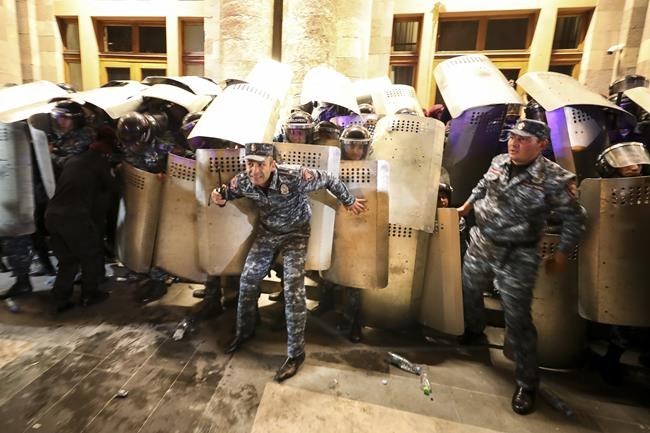OTTAWA — The Canadian government says it's "gravely concerned" about Azerbaijan escalating its military intervention in the Nagorno-Karabakh region, and the Tories are warning of ethnic cleansing.
Both made those comments before Moscow brokered a ceasefire Wednesday in what some analysts feared would be a new war.
Nagorno-Karabakh is internationally recognized as part of Azerbaijan but it is mostly populated by Armenians, and neighbouring Armenia has fought for control of the region since the collapse of the Soviet Union.
Tensions rose in the area a year ago when the region's main access road was blocked, leading to shortages of food and medicine that groups such as Human Rights Watch blame on Azerbaijan.
On Tuesday, Azerbaijan unleashed heavy artillery fire on separatist militias and reportedly killed scores of people, raising concerns of a full-scale war.
Foreign Affairs Minister Mélanie Joly called Tuesday evening for an end to what she called an "unjustifiable military action," and the Conservatives urged Azerbaijan to stop escalating the situation.
"Canada is gravely concerned with the military escalation and deteriorating humanitarian situation in Nagorno-Karabakh resulting from the military intervention announced by Azerbaijan’s defence ministry," Joly wrote.
"We call on the Azerbaijan government to refrain from any actions and activities that pose a risk to the safety and welfare of the civilian population of Nagorno-Karabakh, and to show good faith in facilitating the restoration of humanitarian access."
Azerbaijan and Armenian forces reached a ceasefire agreement Wednesday.Â
That included an agreement to talk Thursday about the "reintegration" of the region into Azerbaijan. That, in addition to guarantees to lay down arms, was widely viewed as a victory for the Azerbaijan government.
It insists the area isn't under a blockade, arguing that food and essentials can be delivered through routes that connect Nagorno-Karabakh with the rest of Azerbaijan. The country argues it made precise strikes on targets of Armenian positions on its sovereign territory.
Azerbaijan officials have blocked the Lachin corridor, which connects the region with Armenia, arguing it's being used to bring in arms for separatists. Joly's statement said the road must be reopened.
Conservative Leader Pierre Poilievre has largely avoided weighing in on foreign policy topics that don't relate to domestic Canadian issues, but he issued a statement Tuesday evening on the incident.
"Conservatives are deeply concerned about the humanitarian crisis in Nagorno-Karabakh because of escalating action by Azerbaijan’s government," Poilievre wrote.
"Starvation is being used as a silent weapon to ethnically cleanse the region. A century after the Armenian genocide, the world cannot silently stand by."
Conservative MP Garnett Genuis spoke in the House of Commons late Tuesday as news broke about the strikes, saying Azerbaijan had "horrified" Canadians.
"It appears it is launching an aggressive war of choice, calling it a 'military operation' and taking a page out of Russia's playbook in the process," he said at the time.
The Network of Azerbaijani Canadians denounced Joly's statement for saying Ottawa supports "self-determination" of Armenians in the region, noting that Canada recognizes the area as part of Azerbaijan's sovereign territory. The Tories also used that term.
A month ago, Azerbaijan's foreign ministry accused Joly of undermining peace in the region by referring to the area by the name used by secessionists, Artsakh, during a speech to Montreal's Armenian community.
Canada is planning to send two officials to support a European monitoring mission that is aiming to prevent another war in the region, and Joly is slated to open an embassy in Armenia next month.
This report by The Canadian Press was first published Sept. 20, 2023.
— With files from The Associated Press.
Dylan Robertson, The Canadian Press




